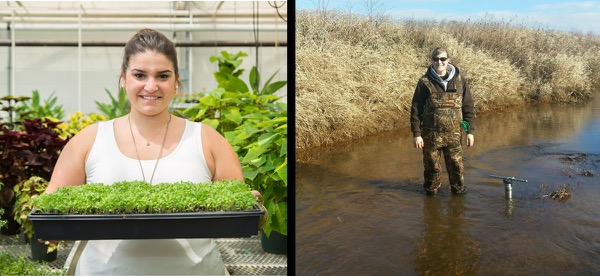
Benton Awards
Markland, Savin named Benton Graduate Student Award recipients
10:44 a.m., June 22, 2015--The University of Delaware’s College of Agriculture and Natural Resources (CANR) has announced that the winners of the 2015 William J. Benton Graduate Student Awards are Sarah Markland and Melissa Savin.
The awards were established in honor of William J. Benton, former CANR associate dean of research and professor in the Department of Animal and Food Sciences (ANFS).
Honors Stories
National Medal of Science
Warren Award
Sarah Markland
Markland recently received her doctorate in animal and food sciences, wrapping up a 10-year career at UD, where she also received her bachelor’s and master’s degrees in food science.
Markland has been working with Kali Kniel, professor of animal and food sciences, to consider ways to keep the world’s food supply safe and sustainable as the world’s population continues to increase.
“By the year 2050, the world’s population is expected to double and we’re going to be expected to produce the same amount of food on the same amount of land but we’re going to be feeding twice the amount of people,” said Markland.
Markland’s primary project involved looking at ways that plants interact with human pathogens with the hope that through the study researchers will able to develop ways plants can fight off human and plant pathogens.
In another study, Markland looked at the use of bacteria that grows naturally in soil that can be used as a biocontrol agent to protect plants and boost immune response.
“They’re also known as plant probiotics,” she said.
Markland said that unlike when a plant is infected with a plant pathogen — during which it will show signs of stress, such as developing chlorosis lesions — a plant infected with a human pathogen does not show signs of stress because it isn’t really a host.
“There are some studies coming out that say if you inoculate salmonella on the plants, they will start to show signs of stress. As a result, there are questions as to whether human pathogens are also plant pathogens and whether organisms like salmonella and E. coli are using plants as a vector to get to us,” said Markland. “These are all different types of questions that we’re trying to answer.”
Markland said she wanted to thank Kniel and Dallas Hoover, professor of animal and food sciences, for all their help during her time at UD.
Now that she has her doctorate, Markland will start a job as a post-doctoral researcher at the University of Florida.
Markland said she chose to complete her degrees at UD, and in the Department of Animal and Food Sciences, because “doors kind of opened at the right time and I took opportunities. I think I was really fortunate and I’ve done really well here. We have one of the best programs in the country, which I think is also why I’ve done so well. We have great professors who are internationally known for the research that they do.”
Melissa Savin
Savin is working on her master’s degree through the graduate program in water science and policy at UD. Her research in the interdisciplinary program has an emphasis on soil and plant science.
As a Kent Conservation District employee, Savin works as an environmental planner stationed in the Delaware Department of Natural Resources and Environmental Control (DNREC) Division of Watershed Stewardship: Drainage Program.
“I go out and look at different sites that need improved drainage or restoration. I help in the planning and permitting process to design viable solutions to meet the drainage concerns while protecting the environment. In my position I serve as a liaison between the drainage program and regulatory agencies to gain approval for the project plans.”
Her current job has direct ties to her studies at UD, as Savin said that her research required her to study tax ditches throughout Delaware to improve ditch management.
“I characterized ditch bottom sediments before and after ditch maintenance and simulated current management following maintenance in the lab to determine nutrient loss potential from these networks,” said Savin. “Minimizing nutrient losses from tax ditch networks is important for protecting water quality especially since many of our ditches ultimately drain to the Chesapeake or Delaware Inland Bays.”
Savin said that she was in ditch systems throughout her entire research project and “that’s how I became interested in the Drainage Program. Now I’m working with these guys to address drainage concerns and I hope to apply my knowledge to make the solutions even better.”
Savin said that she wanted to thank Amy Shober, associate professor in the Department of Plant and Soil Sciences, who she credits with guiding her and conducting interesting research that helped her land in her current career.
Savin said that receiving the award was “pretty awesome. I feel like my hard work really paid off. As a graduate student, you’re working so hard and sometimes you don’t feel like it amounts to anything besides your thesis but to actually be awarded is an honor. I feel like I’m really making a difference.”
Article by Adam Thomas








